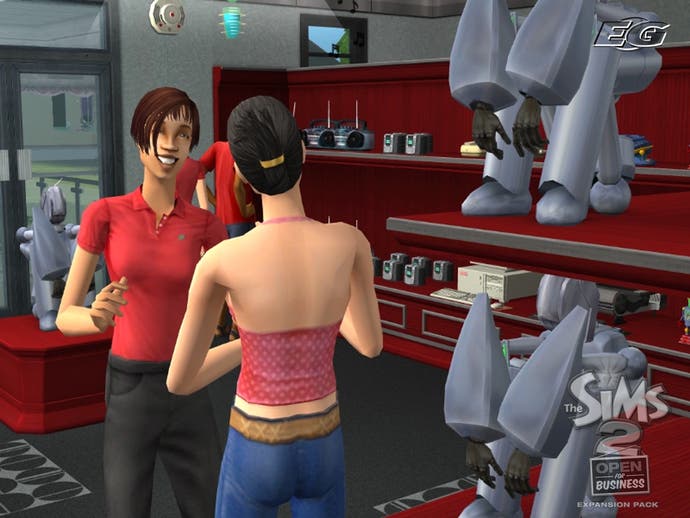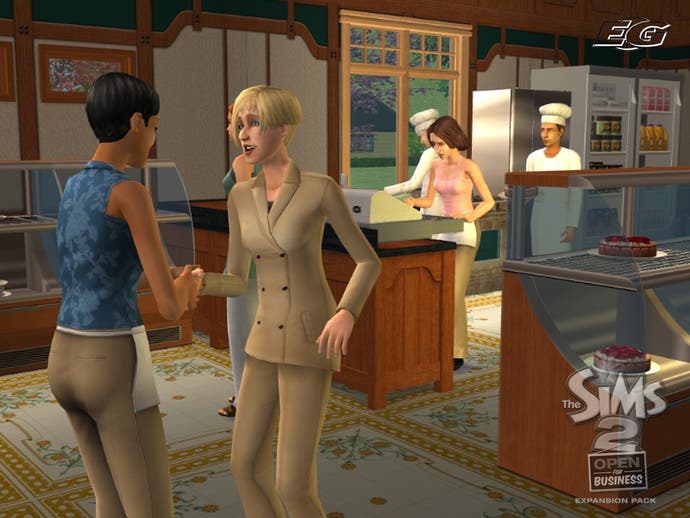The Sims 2 Open For Business
We see it first hand and chat to Maxis about the series as whole.
I think that the really unique thing about The Sims is that it's many, many games rolled into one. You could just do the people simulator part of it and a lot of people do, you could just do the building part of it and a lot of people do. We have players that never turn on the simulator; this is a creativity product to them, and they just build and create and share what they create with others.
I think it will play a larger part in the industry as a whole, I think we're moving towards that. Broadband's more available, and we already know that our community is online and they're downloading. The community still only represents a portion of our players and The Sims is such a mainstream product that I think we're always going to have a retail presence, but I think you'll see us doing more to make it available online. Not for this one, but possibly for future expansions. Part of it is EA is still getting its stuff together and the architecture in place to really support it properly, but we're definitely moving in that direction.
Yeah, there were certain things we'd introduced in expansions that we didn't feel we could remove - the big one was the ability to leave the house - that had become cornerstones of the gameplay.
There are certain things where we've been surprised how popular they are. Specifically from University, the influence system - getting other sims to do things for them. Cars would be a hard thing not to include in a future version if we ever redid The Sims, because once we finally did them in Nightlife and you had a car and your household I couldn't imagine not having one. Certainly looking at Open For Business, more objects that allow the player to be creative. I think you have to take each version and each idea on its own merits and how it fits with the whole of what you're trying to achieve.

It's already pretty complicated. It's probably one of the hardest things about continuing to make The Sims expansions packs - that continual questioning of ourselves about whether it's too complex or too hard.
It's the great challenge and I think our industry faces this challenge across the board any time there's a sequel. The reality is that if you take something like Sims 1, which was this product's purest presentation, it was tuned in such a way that everybody had to be able to figure it out. Even with Sims 2, as game-makers and players we're never going to have that same objectivity again, because everybody's going to come to it with a certain amount of knowledge. There's also this incredible expectation - I mean, you know this as a member of the press - to top what you did before and to add more of what made it successful.
Maybe we could have just done Sims 1 with wants and fears and people would have been able to figure that out, but there is that thing. "Well, this is just like the first on, but..." But then if you go and cut features that can be damaging too. I think every game developer faces that great challenge of trying to do more but not to go so far astray that new people can't pick it up. It's the hardest thing. Making Sims 2 was an incredible challenge.

It's really easy to think that it's just this money-making system that Electronic Arts and Maxis have come up with. It's a business, sure it's a business, but like I said, the fact that half of this pack is about making a bunch of toys that kids can play with... if we're just trying to sell, are we really going to invest time making sure that the in-game toddlers have more things to do? We do that because we know that it makes the game more fulfilling for the player, because for them this is about the human experience for these little people. And there are people out there creating movies, so we think about them as well and what we can add for them, and so it is a very wholesome game development environment.
If you talk to any of the developers, they absolutely love making the game for these consumers, and a lot of the things that get added weren't even designed a lot of the time. Conical roofs are a perfect example of something we kept being told were too hard to do, and one day the engineer who did the roofs just came over and said, look what I figured out how to do. He made these because he knew people wanted them desperately. That's pretty much how it works.
